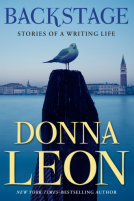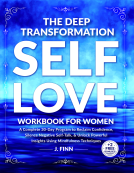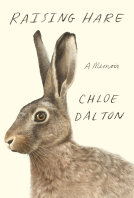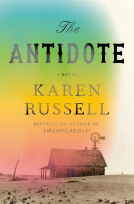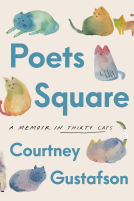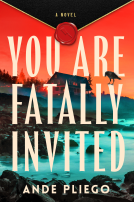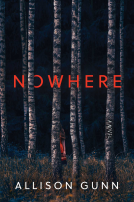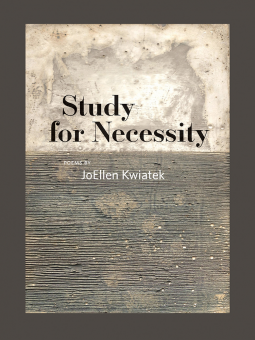
Study for Necessity
by JoEllen Kwiatek
This title was previously available on NetGalley and is now archived.
Send NetGalley books directly to your Kindle or Kindle app
1
To read on a Kindle or Kindle app, please add kindle@netgalley.com as an approved email address to receive files in your Amazon account. Click here for step-by-step instructions.
2
Also find your Kindle email address within your Amazon account, and enter it here.
Pub Date Apr 01 2015 | Archive Date Dec 01 2015
University of Iowa Press | Iowa Poetry Prize
Description
Advance Praise
“In one of her poems, Kwiatek describes consciousness as ‘a thing from another era.’ That other era is a thing that she tries to invent in Study for Necessity. Like the poems of Paul Celan, which these poems often evoke, Kwiatek’s work seems meant to be read on the page, at one’s own pace, and in a kind of meditation. They remind me of carefully composed paintings that show figures in tableaux that are strange and almost otherworldly; but then again, of thoughts that are in the process of materializing into language as through a bright fog. I like that back and forth. Sometimes clear and spare, sometimes tentative and just on the verge of becoming apprehensible, the poems in this book are always linguistically interesting. I found this book’s language, imagery, and atmosphere very captivating.” —Geoffrey Nutter
“Nietzsche pointed to necessity’s (necessarily) constructed nature: ‘Necessity is not a fact, it’s an interpretation.’ In Study for Necessity, JoEllen Kwiatek interprets this abstraction in concrete registers, sourcing it in atmospheres both voluptuous and ascetic. Longevity / is delicate, she writes in ‘Miles to Go.’ Uncanny perceptions—How / small the bonnet / face—disclose persistence at its most persistent. The poems distill so as to dilate. Made of this, and other centuries, consciousness is here a dark and pleated medium, calling things in their strangenesses inescapably near.”—Sarah Gridley
Available Editions
| EDITION | Paperback |
| ISBN | 9781609383244 |
| PRICE | $19.95 (USD) |
Links
Featured Reviews
 Joseph S, Reviewer
Joseph S, Reviewer
Study for Necessity by Joellen Kwiatek is her second published collection of poetry. Kwiatek is a professor in the English department at SUNY Oswego, Oswego, NY. She is the winner of the 2014 Iowa Poetry Prize.
I look forward every year to the reading the collection that won the Iowa Poetry Prize. I see it as the high water mark for the year in poetry. The collections are always excellent or, as last year's choice, very challenging. My background is not in poetry or even literature, but I do appreciate good poetry. My review is not going to be as flowery or as educated as the judges views for this collection, but rather as seen from an educated outsider.
A poet's work is one of those things you know you are going to like or dislike very early on in the reading. I knew I was going to like Kwiatek from the opening lines of her first poem "Sea Below Rocks."
What does the sea see--? Something awful. It has the roving thwarted glance of a mare in blinders, something awful facing her stall.
I immediately caught the obvious sea and see and then found glance (see) and mare (Latin for sea). I knew then, intentional or not, this was going to be a great collection. Throughout the collection phrases seemed to leap out at me "a stone calved from the underworld" and the "radium of twilight." The word usage and imagery is outstanding. Line breaks create different meanings A horse that ran out into the field is "Home" but the next line begins "less." There are several creative breaks in the line structure that take the meaning in different directions.
Poetry is difficult for an outsider to review. Bad or mediocre poetry is easy to pick apart and leads to longer reviews exposing poets trying too hard or even "cutesy" themes. Good and great poetry collections tend to get short reviews from me. They say everything they need to say, and say it so it clicks in my mind as "Exactly!" Although I understand clearly what is being said, I have difficulty repeating it in my own words. It seems that the poet delivers something so perfect, I don't have the words to describe it myself. That is what I believe the essence of poetry is and this collection is one of those cases. Outstanding.
This is a really beautiful collection of poetry. I loved how water- be it the sea, a lake, the rain, a swamp, etc. shows up throughout the collection. It has a calming effect. A couple of examples:
"A small tight rain was falling, dampening the tough grass where my astonishment lay."
"Crossing the hacked up sea of snow, the moon waist-high, lunging and capitulating, addressed by resources that make no sound."
 Earl M, Reviewer
Earl M, Reviewer
The poems in this collection are both responses in the ongoing discussion poems (rather than necessarily poets) throughout history have with each other and wonderful standalone visions for those of us not privy to some of the conversations.
Like any good poetry these poems reward repeated readings and especially reward selected close reading and contemplation. The language, the words and how they are arranged, permit and even demand rereading with modified nuance. These are not just interesting as visions but can, for those so inclined, serve as touchstones for excursions beyond the poems.
I found myself, perhaps on a fourth or fifth reading of a poem, making little side trips every couple of lines, letting the words take me to a point, then letting my mind lead me a bit, then back to the written words, and so on. These moments allowed me to learn a little more about myself and my world while also raising more questions for my next trip with that particular poem.
I definitely recommend this collection to poetry lovers and I would suggest that this might also be a very good book for writers of any kind simply to appreciate and observe the different ways words can be used to paint a picture.
Reviewed from an ARC made available by the publisher via NetGalley.
 Akylina P, Reviewer
Akylina P, Reviewer
I delved into this poetry collection without knowing anything about it and having never read anything by its author. The beautiful cover captivated me from the outset and the title immediately made something inside me click into place. What made me give this book 5 stars, though, was the innovative and utterly mesmerising way those poems blew me away.
Kwiatek's poetry is very hard to describe. The images that each and every one of her poems evoked were enchanting and powerful. I admired her use of diction and the clever way she toyed with her stanzas and the position of each word, which was really thought out. Kwiatek won the Iowa Poetry Prize in 2014 and 'Study for Necessity' clearly indicates why. I will definitely come back to this collection soon, since I feel that there are still many things to be discovered in her poems upon a second reading. Simply a marvelous little book.


